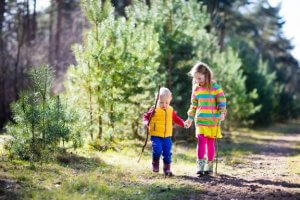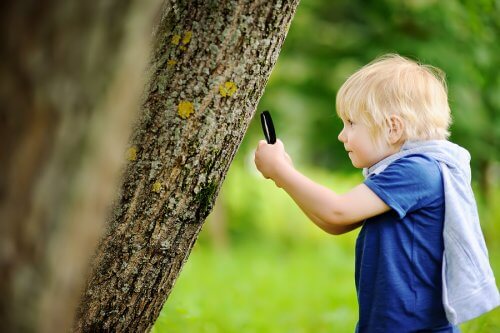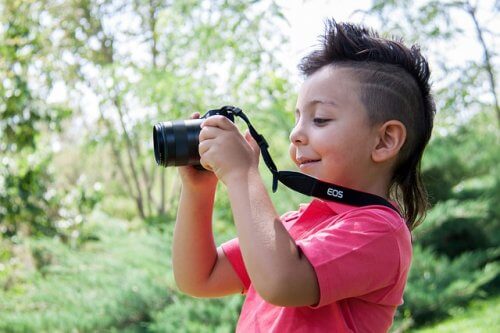The Many Benefits of Being in Contact with Nature

The connection between human beings and nature has existed for thousands and thousands of years – as long as both have existed. For decades, playing amidst nature was the main activity for children.
However, due to the hyper-connectivity that society now experiences when it comes to technology, children have slowly been losing their attraction towards nature. It’s important that we recover this interaction between human beings and their natural surroundings.
The advantages of being in contact with nature
Spending time in contact with nature has always been a fundamental factor in human development. It’s positive for the stimulation of the senses, and offers us the opportunity to get to know and discover all about our natural world.
Especially during childhood, the outdoors are a great stimulus. This is true on a psychical and psychomotor level as well as intellectually.
Below, we’ll take a closer look at the advantages of taking your children on outings to be in contact with nature:
Maximizes sensitivity
This is a very important factor. Contact with nature contributes to a heightened sensitivity in people, no matter what their age.
Constant interaction with nature over the course of our lives helps us understand the importance of the environment. What’s more, it teaches us that we must take care of the environment in order to continue being able to enjoy it.
Encourages exploration, imagination and empathy
Contact with nature from a young age presents tremendous advantages. When children come into contact with nature, it sparks their desire to learn and explore the world they live in.
This is a positive factor, since it immediately activates their creativity and imagination. What’s more, it helps them develop a sense of responsibility when it comes to caring for the natural world.
Stimulates psychomotor abilities
This is, perhaps, one of the most interesting benefits that nature outings offer to small children. Natural environments offer the brain strong stimuli that boost psychomotor development in children. Spending time in nature helps them develop motor skills like agility and balance.

Allows for leisure activities with low environmental impact
Taking your children on nature excursions is a leisure activity that has little to no impact on the environment… as long as you’re careful and respectful, of course.
When you set out to explore forests, lakes, mountains and beaches, you improve the conservation and protection of these natural spaces, given the greater frequency of visits.
Forms healthier individuals
Contact with nature creates people that are more positive, thankful and observant. In practice, happy and healthy human beings release more endorphins, which regulate blood pressure. This results in more balanced and stable health.
Nature outings don’t only benefit us on a physical level, but on an emotional level as well. That’s why spending time outdoors is an extremely healthy activity for anyone.
“Especially during childhood, the outdoors are a great stimulus. This is true on a psychical and psychomotor level as well as intellectually.”
Encourages learning
For children, contact with nature is a truly transcendental experience. It represents a strong stimulus in the learning process. Little ones are constantly curious to discover and explore nature, making it a highly beneficial pedagogical tool.
Contact with nature not only helps establish a relationship of respect and mutual benefit. It also gives children a sense of freedom and responsibility towards the natural world.
Both during childhood and adolescence, contact with nature offers a number of benefits. It’s important for them to go on frequent nature outings where they can make the most of the benefits.

Nature outings: The perfect activity
In conclusion, nature outings offer a number of benefits for human beings of all ages. During any stage of life, contact with nature boosts well-being and a deeper awareness of oneself as well as the world around us.
At the same time, as a pedagogical tool, it’s ideal to make use of nature outings from an early age. In later stages of life, contact with nature continues to be a fundamental stimulus in the formation of free, active, responsible citizens who are aware of the need to care for the environment.
Spending time in nature isn’t just an educational tool. It’s part of something much more important – it’s a matter of health and the formation of good people.
All cited sources were thoroughly reviewed by our team to ensure their quality, reliability, currency, and validity. The bibliography of this article was considered reliable and of academic or scientific accuracy.
- Felipe, Y. L., Hernández, M. M., & Gómez, N. A. (2018). La excursión a la naturaleza o práctica de campo: una necesidad en la preparación metodológica de los docentes para contribuir al desarrollo local. Foro educacional, (30), 137-152. https://dialnet.unirioja.es/servlet/articulo?codigo=6669657
- Gómez, J. F. (2012). Vida en la Naturaleza. Revista Pasos, 38.
- Seral, J. C., & Correas, R. G. (2000). Actividades en la naturaleza (Vol. 560). INDE.
- Lara, F. A., Aguilar, A. G., López, L. H., López, R. M. M., Rodríguez, J. A. M., & de Castro Calvo, M. C. R. (1996). Actividades en la Naturaleza.
This text is provided for informational purposes only and does not replace consultation with a professional. If in doubt, consult your specialist.








